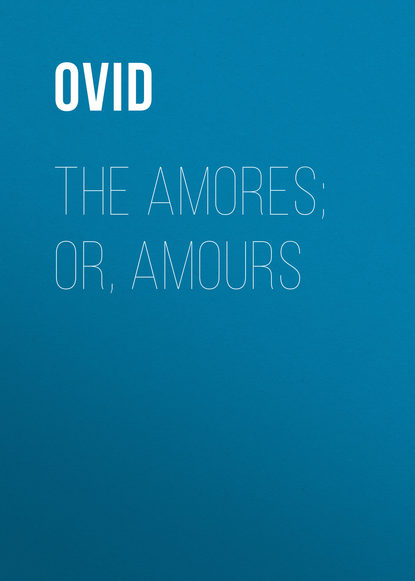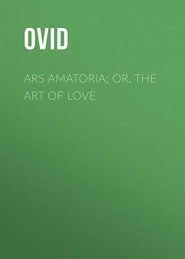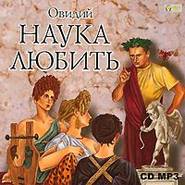По всем вопросам обращайтесь на: info@litportal.ru
(©) 2003-2024.
✖
The Amores; or, Amours
Настройки чтения
Размер шрифта
Высота строк
Поля
[ Your limited savings.—Ver. 39. 'Peculium,' here means the stock of money which a slave, with the consent of his master, laid up for his own, 'his savings.' The slaves of the Romans being not only employed in domestic offices and the labours of the field, but as agents or factors for their masters, in the management of business, and as mechanics and artisans in various trades, great profits were made through them. As they were often entrusted with a large amount of property, and considerable temptations were presented to their honesty, it became the practice to allow the slave to consider a part of his gains, perhaps a per centage, as his own; this was termed his 'peculium.' According to the strict letter of the law, the 'peculium' was the property of the master, but, by usage, it was looked upon as the property of the slave. It was sometimes agreed upon between the master and slave, that the latter should purchase his liberty with his 'peculium,' when it amounted to a certain sum. If the slave was manumitted by the owner in his lifetime, his 'peculium' was considered to be given him, with his liberty, unless it was expressly retained.]
315 (return (#x3_x_3_i13))
[ Necks of informers.—Ver. 41. He probably alludes to informers who have given false evidence. He warns Bagous of their fate, intending to imply that both his mistress and himself will deny all, if he should attempt to criminate them.]
325 (return (#x3_x_3_i13))
[ Tongue caused this.—Ver. 44. According to one account, his punishment was inflicted for revealing the secrets of the Gods.]
326 (return (#x3_x_3_i13))
[ Appointed by Juno.—Ver. 45. This was Argus, whose fate is related at the end of the First Book of the Metamorphoses.]
327 (return (#x3_x_3_i20))
[ Alas! that.—Ver. 1. He is again addressing Bagous, and begins in a strain of sympathy, since his last letter has proved of no avail with the obdurate eunuch.]
328 (return (#x3_x_3_i20))
[ Mutilate Joys —Ver. 3. According to most accounts, Semiramis was the first who put in practice this abominable custom.]
329 (return (#x3_x_3_i20))
[ Standard be borne.—Ver. 10. He means, that he is bound, with his mistress to follow the standard of Cupid, and not of Mars.]
330 (return (#x3_x_3_i21))
[ Favours to advantage.—Ver. 13. 'Ponere' here means, literally, 'to put out at interest.' He tells the eunuch that he has now the opportunity of conferring obligations, which will bring him in à good interest by way of return.]
332 (return (#x3_x_3_i27))
[ Sabine dames.—Ver. 15. Juvenal, in his Tenth Satire, 1. 293, mentions the Sabine women as examples of prudence and chastity.]
333 (return (#x3_x_3_i27))
[ In her stateliness.—Ver. 16. Burmann would have 'ex alto' to mean 'ex alto pectore,' 'from the depths of her breast.' In such case the phrase will correspond with our expression, 'to dissemble deeply,' 'to be a deep dissembler.']
334 (return (#x3_x_3_i28))
[ Modulates her voice.—Ver. 25. Perhaps 'flectere vocem' means what we technically call, in the musical art, 'to quaver.']
335 (return (#x3_x_3_i28))
[ Her arms to time.—Ver. 29. Dancing was, in general, discouraged among the Romans. That here referred to was probably the pantomimic dance, in which, while all parts of the body were called into action, the gestures of the arms and hands were especially used, whence the expressions 'manus loquacissimi,' 'digiti clamosi,' 'expressive hands,' or 'fingers.' During the Republic, and the earlier periods of the Empire, women never appeared on the stage, but they frequently acted at the parties of the great. As it was deemed disgraceful for a free man to dance, the practice at Rome was probably confined to slaves, and the lowest class of the citizens. See the Fasti, Book iii. 1. 536, and the Note to the passage.]
336 (return (#x3_x_3_i28))
[ Hippolytus.—Ver. 32. Hippolytus was an example of chastity, while Priapus was the very ideal of lustfulness.]
337 (return (#x3_x_3_i28))
[ Heroines of old.—Ver. 33. He supposes the women of the Heroic ages to have been of extremely tall stature. Andromache was remarkable for her height.]
338 (return (#x3_x_3_i28))
[ The brunette.—Ver. 39. 'Flava,' when coupled with a female name, generally signifies 'having the hair of a flaxen,' or 'golden colour'; here, however, it seems to allude to the complexion, though it would be difficult to say what tint is meant. Perhaps an American would have no difficulty in translating it 'a yellow girl.' In the 43rd line, he makes reference to the hair of a 'flaxen,' or 'golden colour.']
339 (return (#x3_x_3_i33))
[ Tablets rubbed out.—Ver. 5. If 'deletæ' is the correct reading here, it must mean 'no tablets from which in a hurry you 'have rubbed off the writing.' 'Non interceptæ' has been suggested, and it would certainly better suit the sense. 'No intercepted tablets have, &c.']
342 (return (#x3_x_3_i34))
[ The wine on table.—Ver. 14. The wine was probably on this occasion placed on the table, after the 'coena,' or dinner. The Poet, his mistress, and his acquaintance, were, probably, reclining on their respective couches; he probably, pretended to fall asleep to watch, their conduct, which may have previously excited his suspicions.]
343 (return (#x3_x_3_i34))
[ Moving your eyebrows.—Ver. 15. See the Note to the 19th line of the Fourth Elegy of the preceding Book.]
344 (return (#x3_x_3_i34))
[ Were not silent.—Ver. 17. See the Note to the 20th line of the same Elegy.]
345 (return (#x3_x_3_i34))
[ Traced over with wine.—Ver. 18. See the 22nd and 26th lines of the same Elegy.]
346 (return (#x3_x_3_i34))
[ Your discourse.—Ver. 19. He seems to mean that they were pretending to be talking on a different subject from that about which they were really discoursing, but that he understood their hidden meaning. See a similar instance mentioned in the Epistle of Paris to Helen, 1. 241.]
347 (return (#x3_x_3_i35))
[ Hand of a master.—Ver. 30. He asserts the same right over her favours, that the master (dominus) does over the services of the slave.]
348 (return (#x3_x_3_i36))
[ New-made husband.—Ter. 36. Perhaps this refers to the moment of taking off the bridal veil, or 'flammeum,' when she has entered her husband's house.]
349 (return (#x3_x_3_i36))
[ Of her steeds.—Ver. 38. When the moon appeared red, probably through a fog, it was supposed that she was being subjected to the spells of witches and enchanters.]
350 (return (#x3_x_3_i36))
[ Assyrian ivory.—Ver. 40. As Assyria adjoined India, the word 'Assyrium' is here used by poetical licence, as really meaning 'Indian.']
351 (return (#x3_x_3_i36))
315 (return (#x3_x_3_i13))
[ Necks of informers.—Ver. 41. He probably alludes to informers who have given false evidence. He warns Bagous of their fate, intending to imply that both his mistress and himself will deny all, if he should attempt to criminate them.]
325 (return (#x3_x_3_i13))
[ Tongue caused this.—Ver. 44. According to one account, his punishment was inflicted for revealing the secrets of the Gods.]
326 (return (#x3_x_3_i13))
[ Appointed by Juno.—Ver. 45. This was Argus, whose fate is related at the end of the First Book of the Metamorphoses.]
327 (return (#x3_x_3_i20))
[ Alas! that.—Ver. 1. He is again addressing Bagous, and begins in a strain of sympathy, since his last letter has proved of no avail with the obdurate eunuch.]
328 (return (#x3_x_3_i20))
[ Mutilate Joys —Ver. 3. According to most accounts, Semiramis was the first who put in practice this abominable custom.]
329 (return (#x3_x_3_i20))
[ Standard be borne.—Ver. 10. He means, that he is bound, with his mistress to follow the standard of Cupid, and not of Mars.]
330 (return (#x3_x_3_i21))
[ Favours to advantage.—Ver. 13. 'Ponere' here means, literally, 'to put out at interest.' He tells the eunuch that he has now the opportunity of conferring obligations, which will bring him in à good interest by way of return.]
332 (return (#x3_x_3_i27))
[ Sabine dames.—Ver. 15. Juvenal, in his Tenth Satire, 1. 293, mentions the Sabine women as examples of prudence and chastity.]
333 (return (#x3_x_3_i27))
[ In her stateliness.—Ver. 16. Burmann would have 'ex alto' to mean 'ex alto pectore,' 'from the depths of her breast.' In such case the phrase will correspond with our expression, 'to dissemble deeply,' 'to be a deep dissembler.']
334 (return (#x3_x_3_i28))
[ Modulates her voice.—Ver. 25. Perhaps 'flectere vocem' means what we technically call, in the musical art, 'to quaver.']
335 (return (#x3_x_3_i28))
[ Her arms to time.—Ver. 29. Dancing was, in general, discouraged among the Romans. That here referred to was probably the pantomimic dance, in which, while all parts of the body were called into action, the gestures of the arms and hands were especially used, whence the expressions 'manus loquacissimi,' 'digiti clamosi,' 'expressive hands,' or 'fingers.' During the Republic, and the earlier periods of the Empire, women never appeared on the stage, but they frequently acted at the parties of the great. As it was deemed disgraceful for a free man to dance, the practice at Rome was probably confined to slaves, and the lowest class of the citizens. See the Fasti, Book iii. 1. 536, and the Note to the passage.]
336 (return (#x3_x_3_i28))
[ Hippolytus.—Ver. 32. Hippolytus was an example of chastity, while Priapus was the very ideal of lustfulness.]
337 (return (#x3_x_3_i28))
[ Heroines of old.—Ver. 33. He supposes the women of the Heroic ages to have been of extremely tall stature. Andromache was remarkable for her height.]
338 (return (#x3_x_3_i28))
[ The brunette.—Ver. 39. 'Flava,' when coupled with a female name, generally signifies 'having the hair of a flaxen,' or 'golden colour'; here, however, it seems to allude to the complexion, though it would be difficult to say what tint is meant. Perhaps an American would have no difficulty in translating it 'a yellow girl.' In the 43rd line, he makes reference to the hair of a 'flaxen,' or 'golden colour.']
339 (return (#x3_x_3_i33))
[ Tablets rubbed out.—Ver. 5. If 'deletæ' is the correct reading here, it must mean 'no tablets from which in a hurry you 'have rubbed off the writing.' 'Non interceptæ' has been suggested, and it would certainly better suit the sense. 'No intercepted tablets have, &c.']
342 (return (#x3_x_3_i34))
[ The wine on table.—Ver. 14. The wine was probably on this occasion placed on the table, after the 'coena,' or dinner. The Poet, his mistress, and his acquaintance, were, probably, reclining on their respective couches; he probably, pretended to fall asleep to watch, their conduct, which may have previously excited his suspicions.]
343 (return (#x3_x_3_i34))
[ Moving your eyebrows.—Ver. 15. See the Note to the 19th line of the Fourth Elegy of the preceding Book.]
344 (return (#x3_x_3_i34))
[ Were not silent.—Ver. 17. See the Note to the 20th line of the same Elegy.]
345 (return (#x3_x_3_i34))
[ Traced over with wine.—Ver. 18. See the 22nd and 26th lines of the same Elegy.]
346 (return (#x3_x_3_i34))
[ Your discourse.—Ver. 19. He seems to mean that they were pretending to be talking on a different subject from that about which they were really discoursing, but that he understood their hidden meaning. See a similar instance mentioned in the Epistle of Paris to Helen, 1. 241.]
347 (return (#x3_x_3_i35))
[ Hand of a master.—Ver. 30. He asserts the same right over her favours, that the master (dominus) does over the services of the slave.]
348 (return (#x3_x_3_i36))
[ New-made husband.—Ter. 36. Perhaps this refers to the moment of taking off the bridal veil, or 'flammeum,' when she has entered her husband's house.]
349 (return (#x3_x_3_i36))
[ Of her steeds.—Ver. 38. When the moon appeared red, probably through a fog, it was supposed that she was being subjected to the spells of witches and enchanters.]
350 (return (#x3_x_3_i36))
[ Assyrian ivory.—Ver. 40. As Assyria adjoined India, the word 'Assyrium' is here used by poetical licence, as really meaning 'Indian.']
351 (return (#x3_x_3_i36))














